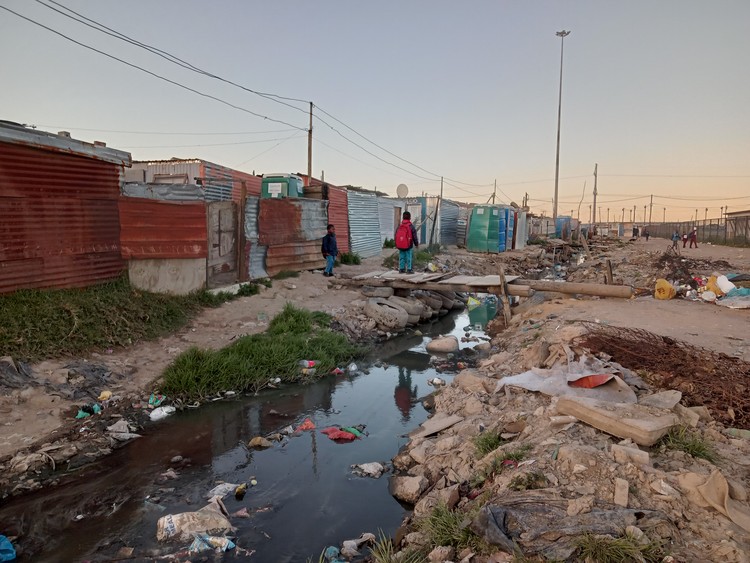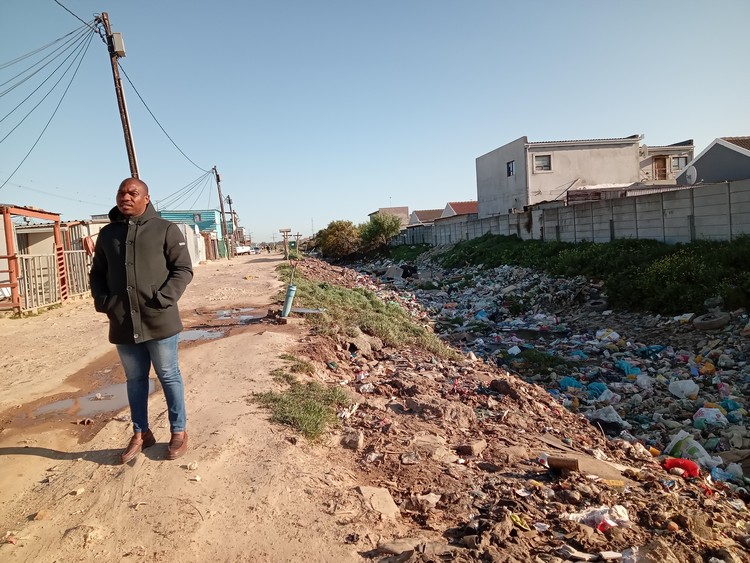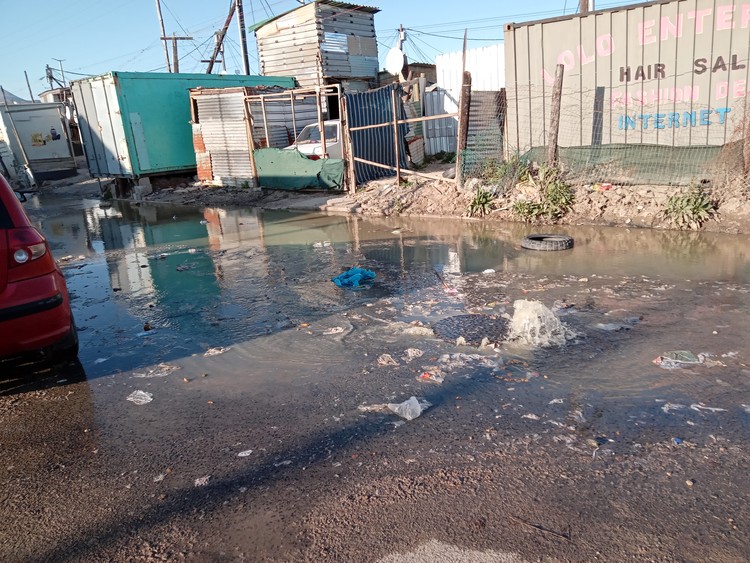Strand residents worried about ‘out of hand’ illegal dumping
City says it currently manages about 2.1-million tonnes of waste annually across the metro
Learner crossing a polluted canal on a makeshift bridge in Nomzamo, Strand. Photos: Bongane Motaung
- Families living in informal settlements in Nomzamo, Strand are worried about stinking sewage spills, and waste strewn across open spaces around their homes.
- A community leader from Freedom Park says waste management and sewage spills in most informal settlements in ward 85 worsened this winter.
- The City of Cape Town says it has identified eight sites in need of repairs. But it says shacks are erected on top of critical sewerage infrastructure at some of these sites, so it is unable to fix the problem.
Residents living in informal settlements in Nomzamo, Strand are worried about several pools of smelly sewage and piles of rubbish strewn across open spaces near their homes.
They are worried that the highly polluted environment will affect young children and the elderly.
“We have tried everything to get help, but our efforts aren’t enough,” says Mafuza Ralarala, chairperson of the Freedom Park community committee. He said waste management and the sewage situation in most informal settlements in ward 85 worsened this winter.
Walking through parts of Freedom Park, it’s hard to miss the streams of stagnant sewage between shacks and walkways used by learners. Several canals and open spaces around the informal settlement are littered with plastic, food waste, discarded furniture and even human faeces. We passed one of the City of Cape Town’s waste containers. There were a few neatly packed blue refuse bags with other cleaning material. This was right next to an illegal dump site.
Ralarala said that each time a drain gets blocked, City of Cape Town does send workers to fix the problem, but three days later the same drain is blocked again. He said government also needed to install more taps and flushing toilets. It also needs to clean filthy canals. He said currently about ten households share one chemical toilet.
Ralarala showed us several small wooden makeshift bridges which residents built to assist learners crossing canals in Freedom Park to get to school. These canals had murky and stinky water in them. We saw some learners helping each other to cross, while others were helped by their parents over the crossing.
Freedom Park resident Zikhona Blaai, whose 11-year-old son regularly crosses the makeshift crossings, told GroundUp that the City regularly offers residents refuse bags, but community members did not always use them. She said they need a solution urgently.
Community leader Lwazi Mlonyeni said that in 2014, the community was promised that they would be relocated to land in Makhaza, but now that land is occupied. “Following the recent floods, the City’s disaster management came to take photos and promised to rescue and build homes for affected families. Nothing came of it,” he said.
Ward 85 Councillor Chantal Cerfontein said she is waiting for feedback from the human settlements department report following a site inspection to identify sewerage blockages, overflows and illegal dumping.
Mafuza Ralarala, chairperson of the Freedom Park community committee, showed one of many areas in the informal settlement where waste is out of control.
Cerfontein said that while 100 Public Works workers are deployed in the community to clean streets and other areas, she emphasised that keeping these spaces clean was also the responsibility of residents.
On the relocation of some residents, the councillor said that another plot had been identified.
On 17 September the City invited residents to comment on its Waste Strategy. Part of this strategy is tackling illegal dumping, reducing waste that ends up at landfills, and encouraging recycling. The deadline for comments is 18 October 2024.
Currently the City expects an increase of pressure on waste management as the population of Cape Town is projected to expand to 5.8 million by 2040, while it currently manages about 2.1-million tonnes of waste annually.
Every day, Cape Town generates enough waste to fill an Olympic-sized swimming pool. In 2023/24, illegal dumping totalled about 15,000 tonnes of waste collected per month, the City said.
“Ensuring that all residents, including residents in informal settlements, backyard dwellings and small-scale rental units, have access to quality waste services is critical in transforming the waste sector,” the City said.
City spokesperson Luthando Tyhalibongo said teams visited eight sites where infrastructure could not be fixed because residents had illegally erected homes on top of sewerage lines. The City has plans to relocate them, he confirmed.
“There has been some positive agreement on this, and if all goes to plan, it will enable the various City line departments that are focusing on this matter to action plans for the betterment of the infrastructure and for this community,” he said.
Published in partnership with Intuthuko News.
One of many pools of overflowing sewage in Nomzamo.
Support independent journalism
Donate using Payfast

Don't miss out on the latest news
We respect your privacy, and promise we won't spam you.
Next: Villagers have had no tap water for 15 years, but they live 3km from a dam
Previous: Pretoria township devastated by fire
© 2024 GroundUp. This article is licensed under a Creative Commons Attribution-NoDerivatives 4.0 International License.
You may republish this article, so long as you credit the authors and GroundUp, and do not change the text. Please include a link back to the original article.
We put an invisible pixel in the article so that we can count traffic to republishers. All analytics tools are solely on our servers. We do not give our logs to any third party. Logs are deleted after two weeks. We do not use any IP address identifying information except to count regional traffic. We are solely interested in counting hits, not tracking users. If you republish, please do not delete the invisible pixel.



